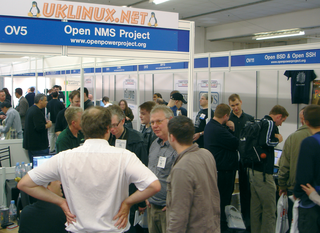
By Jon Masters
The second annual LinuxWorld UK Expo was held at London's Kensington Olympia Conference and Exhibition Center on October 5-6, 2005. Over 70 exhibitors demonstrated their latest products and services. Among those in attendance were the usual industry mainstays - IBM, Novell and Sun - as well as many media outlets (including Linux Magazine) and an eclectic mixture of community groups forming a ".org village."
In addition to the regular crowd of Linux-centric companies, it was pleasing to see a number of newcomers to the show - both on the large and small end.
Newcomers included a number of smaller companies offering everything from managed Internet hosting to SSL certificates for secure commerce. It was exciting to also see a few new startups in the crowd. The number of new companies at the show is perhaps a good example of the growing upturn in the fortunes of the tech sector.
This reporter spent some time talking to the folks from Capacity4Hire, who announced their new on-demand computing service would go live on 1 November. The service appears to be based on a hybrid combination of PXE-booting, network-imaged real servers, with some front-end web logic that allows customers to create on-the-fly server configurations at the click of a button.
Simultaneously with the main expo, a parallel track of conference sessions included speakers such as Alan Cox (of Linux kernel fame) and Mark Shuttleworth (retired cosmonaut and founder of the Ubuntu project). Alan spoke on the technical growing pains faced by the Linux desktop. He argued that having multiple desktop projects provides a level of choice, adding that most enterprise desktops today are formed from a hybrid of best-of-breed applications from both Gnome and KDE. Problems are often related to the enterprise configuration and management of thousands of identical Linux desktop installations - an area where KDE apparently has the upper hand, though Gnome's gconf tools are an untapped potential rival to Microsoft's group policies.
Mark Shuttleworth talked at some length about the direction the Ubuntu Linux project is heading. He also discussed the growing number of other projects that have rebased themselves upon Ubuntu as a core. In an earlier presentation, Klaus Knopper (of the Knoppix project) had already spoken about the cross-over between his work and that of projects like Ubuntu. Mark mentioned the Launchpad project, which aims to integrate the many disparate project-specific Bugzilla tracking systems in use today. A question and answer session wrapped up yet another very successful talk.
LinuxWorld Expo also played home to the third annual Linux Awards ceremony. At this gala black tie dinner, awards recognizing the unique contributions of companies and individuals were presented amid various other entertainment. Among those receiving awards this year were IBM (for the OpenPower project), Nokia (for the forthcoming Nokia 770 Debian-based tablet device), and Alan Cox (for a lifetime of fantastic achievement). Some of the more unusual awards went to Eclipse and GCC (for best Open Source Developer Tool) and Spread Firefox (for the fantastic success of the community driven Firefox marketing campaign, which even saw an advert in the New York Times.) Reader-judged awards went to folks such as Joomla! (for their content management software based upon Mambo) and Ubuntu (Best Linux/Open Source distribution.) Powys County council received an award for their deployment of Powys School servers in local high schools.
This was only the second year of the LinuxWorld franchise in the UK and it proved to be even more popular than the first. The exhibitors, speakers, and community groups joined to form a very successful event. Next year's show is already in planning.